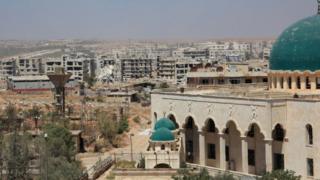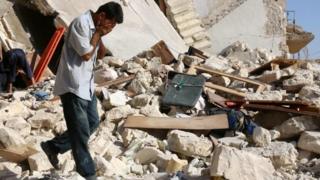Rights groups and civilians trapped in opposition-held neighborhoods in eastern Aleppo reacted critically to Russia's plan, saying it does not guarantee safe passage or give residents a choice of where they flee to. Some residents fear the proposed corridors are intended to restore government control over parts of the city that have been in rebel hands since 2012. U.N. envoy Staffan de Mistura said he was not consulted on the proposal, which was first announced Thursday by the Russian defense ministry. "That's our job," de Mistura said of the corridors plan at a press conference in Geneva. He expressed support "in principle" for humanitarian corridors but said it must be "under the right circumstances." "How do you expect people to walk through a corridor - thousands of them - while there is shelling, bombing, fighting?" de Mistura said. He said he is awaiting clarification from Russian authorities about the plan, noting the urgent situation in the city, wracked by devastating violence in recent months. "The clock is ticking for the Aleppo population," he said.
The U.N. says Aleppo is now possibly the largest besieged area in Syria, with an estimated 300,000 residents trapped inside. Robert Mardini, Middle East director for the International Committee for the Red Cross, said those who choose to stay in Aleppo must be protected and that all parties must allow humanitarian agencies to reach them. "Humanitarian corridors need to be well and carefully planned, and have to be implemented with the consent of parties on all sides," Mardini said. He said he had no indication that all involved groups had agreed to the plan. With airstrikes on Aleppo continuing, the Russian proposal seems more like an effort to "depopulate Aleppo City in preparation for concerted pro-regime ground operations to force the surrender of opposition groups within the city," the Institute for the Study of War said in a brief. Late night airstrikes in the city killed at least six people, the activist-run Aleppo Media Center said Friday.
Osama Abo Elezz, a general surgeon from Aleppo who was stranded in Turkey because of the siege, said the idea of allowing people to evacuate the city "offers a service to the regime and the Russians, and forces people to go to areas they don't want to go to." He said that if the U.N. allows residents to travel safely to other opposition held-areas, this could reassure people that it is safe to leave and would reduce casualty numbers. There were no reports of civilians using the corridors on Friday. Rebel fighters were forbidding people from using the Bustan al-Qasr crossing, in the north of the city, "out of fear for their safety," according to Khaled Khatib, a volunteer for the Civil Defense search-and-rescue brigade. He said civilians who leave the city risk being shot by government snipers or being detained because of their opposition sympathies.
Also on Friday, in the neighboring province of Idlib, the charity Save the Children said a maternity hospital it supports in the opposition-held area had been hit with three airstrikes. One struck the entrance, killing two men who were waiting for their wives who were delivering, said AbdulKarim Ekzayez, health co-ordinator at Save the Children International. He said reports from the hospital suggest six or seven people were injured, though he could not yet give precise figures. A lot of equipment, including incubators for newborns, was damaged. The Britain-based Syrian Observatory for Human Rights said airstrikes in Kafr Takhareem village in Idlib hit a hospital and a center for civil defense volunteers. The group said the hospital was damaged and there were initial reports of casualties. It said the hospital was no longer operational. The Observatory said an Islamist militant was believed to have been killed in the attack. Syrian state TV said government warplanes carried out an airstrike in the same area, also claiming it killed a senior Islamist militant without naming him.
MORE


